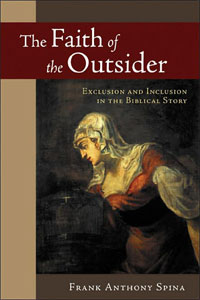Book Notes
 Frank Anthony Spina, The Faith of the Outsider; Exclusion and Inclusion in the Biblical Story (Grand Rapids: Eerdmans, 2005), 206pp.
Frank Anthony Spina, The Faith of the Outsider; Exclusion and Inclusion in the Biblical Story (Grand Rapids: Eerdmans, 2005), 206pp.
For my mother's funeral one of my five siblings chose not to attend the services. After his divorce my brother married an African-American woman and he fretted whether our little church in small-town North Carolina would welcome them. I don't know if he was wise and perceptive in this regard, or projected his insecurities onto others, but the threat of exclusion and marginalization as an "outsider" is a potent toxin for most all of us. No one wants to be an outsider.
In his book The Faith of the Outsider the Old Testament scholar Frank Spina makes a "close reading" of this insider-outsider motif in the Bible. He begins with the unpopular reminder that it is impossible to ignore the presence of what scholars call the "scandal of particularity" throughout Scripture. In the Old Testament, Israel alone is God's elect people: "You only have I known of all the families of the earth" (Amos 3:2). Israel is not only God's special insider community; as Spina notes, "it is the only insider community." All other nations need not apply. Similarly, in the New Testament the early Christians proclaimed that "no one comes to the Father except through Jesus" (John 14:6). If you excised this insider theme from the biblical narrative you would end up with a slender Bible indeed.
But that is only part of the story, and one that is significantly enriched by other elements of the plot. When God elected a single community, Israel, His intentions were categorically universal in scope, that in Abraham "all peoples on earth will be blessed" (Genesis 12:3). Those same early Christians who proclaimed Jesus as the only way also imagined heaven populated with "a great multitude that no one could count, from every nation, tribe, people and language" (Revelation 7:9). When we read the Bible carefully we notice how often it features prominent outsiders. This inclusion of outsider stories, Spina argues, is "neither incidental nor haphazard in the biblical witness." These outsider stories often include a significant plot reversal in which the ostensible insider is cast in a negative light and the outsider is portrayed as superior in virtue or faith. In his book Spina considers seven of these stories where the outsider is mainlined and the insider is marginalized—Esau, Tamar (incest), Rahab (a whore), Naaman, Jonah, Ruth (a resident alien who remarries a Hebrew), and the woman at the well in John 4 who had married five times.
This book will remind you of Miroslav Volf's Exclusion and Embrace. While Volf is a theologian, Spina is a Biblical scholar, and the goal of the so-called "close reading" that he undertakes is to read these stories as stand-alone objects with their own content, rather than as a subjective social constructions. We must attempt to understand them, in other words, in and of themselves, without recourse to outside sources, especially the trendy, chic, and politically-correct sources of the post-structuralists. I loved this book about such an important Biblical motif, and only wish that Spina had given us a final chapter that reviews and summarizes the themes in a comprehensive fashion, suggesting some contemporary implications and applications.


